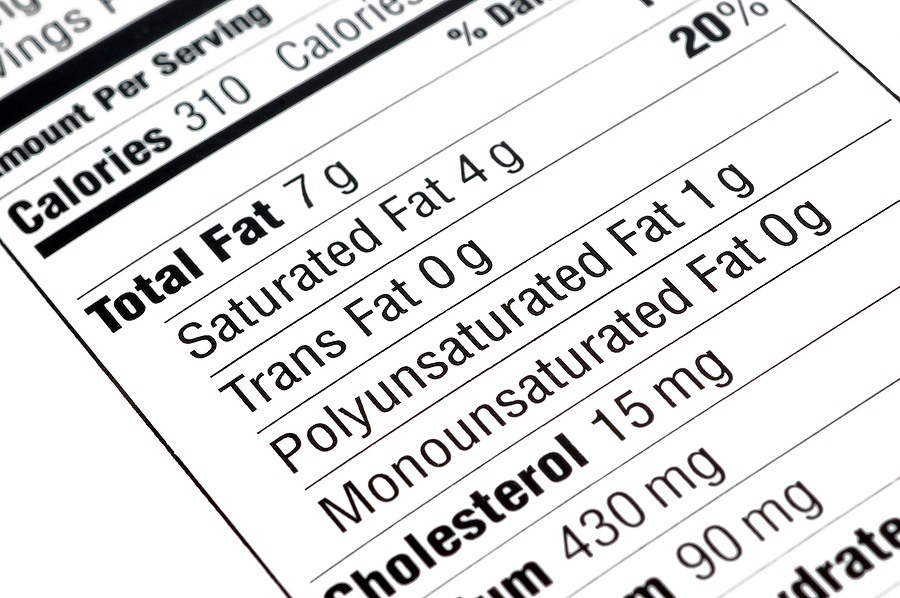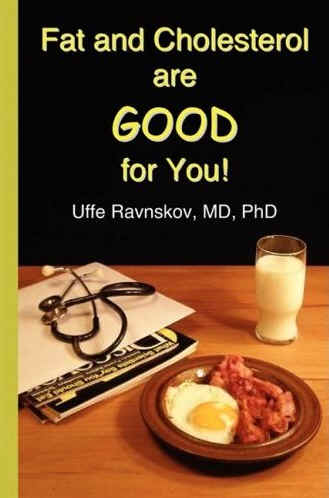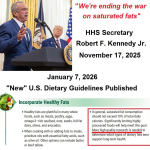
by Brian Shilhavy
Health Impact News Editor
A study published in the Annals of Internal Medicine made waves through the mainstream media this week. In a stunning meta-analysis of the relationship between dietary fats and heart disease that included over 600,000 people, the researchers came to the following conclusion:
“Current evidence does not clearly support cardiovascular guidelines that encourage high consumption of polyunsaturated fatty acids and low consumption of total saturated fats.”
This conclusion flies in direct contrast to the USDA dietary guidelines, which recommend polyunsaturated fats (think corn and soybean oils) as healthy, and saturated fats as unhealthy (think dairy, animal fat, and coconut oil) in terms of cardiovascular health.
This is certainly not the first study that has been published in the past few years clearly showing there is no link between saturated fats consumption and heart disease. In 2010, a meta analysis was published in the American Journal of Clinical Nutrition: Meta-analysis of prospective cohort studies evaluating the association of saturated fat with cardiovascular disease. This analysis looked at 347,747 patients from clinical studies during a 23 year period and found that there was no link between saturated fat and heart disease.
In 2013, a study was published in Advances in Nutrition by Glen D. Lawrence, PhD, from the Department of Chemistry and Biochemistry at Long Island University in Brooklyn, NY: Dietary Fats and Health: Dietary Recommendations in the Context of Scientific Evidence. Dr. Lawrence looked at several meta analyses regarding dietary fats and oils, including one meta-analysis regarding consumption of red meat that included over 1 million people, that showed no connection between saturated fat consumption and heart disease. He too concluded that dietary guidelines against saturated fats were wrong, and pointed out how the research actually showed that the consumption of saturated fats in dairy and coconut oil promoted better heart health (see: Study: Saturated Fat Not Associated with Risk of Coronary Artery Disease, Coconut Oil and Dairy Fat Healthy).
In this current study, it seems very obvious that the researchers were questioning conventional dietary advice encouraging the consumption of polyunsaturated fats and the avoidance of saturated fats as a way of preventing heart disease. This is what they wrote regarding the purpose of the study:
Background: Guidelines advocate changes in fatty acid consumption to promote cardiovascular health.
Purpose: To summarize evidence about associations between fatty acids and coronary disease.
Study Funded by Medical Industry Insiders
What is so surprising about this research is that it was published by pharmaceutical industry insiders, mostly from the U.K. Here is the list of universities the research authors are from:
University of Cambridge and Medical Research Council, Cambridge, United Kingdom; Harvard School of Public Health, Boston, Massachusetts; University of Oxford, Oxford, United Kingdom; School of Public Health, Imperial College London, London, United Kingdom; Centre for Exercise, Nutrition and Health Sciences, University of Bristol, Bristol, United Kingdom; and Erasmus University Medical Center, Rotterdam, the Netherlands.
Note that Harvard is the lone U.S. research center in the study. Dr. Mozaffarian is one of a few researchers at Harvard who has begun to question the relationship between dietary fats and heart disease in recent years.
The study was funded with a grant from: “the British Heart Foundation, Medical Research Council, Cambridge National Institute for Health Research Biomedical Research Centre, and Gates Cambridge.”
Will Government Dietary Guidelines Change?
So why are Big Pharma industry insiders publishing a study like this after years of promoting just the opposite? I don’t know. So will official government advice regarding dietary fats now change?
In the U.K., perhaps. Most of the researchers were from the U.K., and most of the participants in the studies that were analyzed were also from Europe.
Last year, Sweden took some major steps towards moving away from the low-fat dietary advice with many researchers there encouraging a high-fat low-carb dietary approach (see: Sweden Becomes First Western Nation to Reject Low-fat Diet Dogma in Favor of Low-carb High-fat Nutrition). Also, last year British cardiologist Dr. Aseem Malhotra made waves when he published an article in the British Medical Journal stating that carbohydrates, not saturated fats, were the real problem associated with obesity and other diseases (see: Cardiologist Speaks Out On The Myth of Bad Saturated Fat, Stating Carbs Are More Damaging Than Butter).
What about the U.S. and the USDA dietary guidelines? Any chance they will change to reflect all of this modern research showing their advice is wrong?
To help understand the answer to that question, let’s see how the mainstream U.S. media covered this story in the past 24 hours. Here is how Reuters covered the story, which was picked up by many U.S. media companies like Fox News:
Linda Van Horn, from the Northwestern University Feinberg School of Medicine in Chicago, told Reuters Health the study was well done and demonstrated that some fatty acids are better than others. But it’s not enough to change current guidelines, she added.
Van Horn chaired the 2010 U.S. Dietary Guidelines Advisory Committee which was involved in creating federal recommendations and is a spokesperson for the American Heart Association. She was not involved in the new review.
“People need to eat as has been recommended – this paper changes nothing about the adverse impact of saturated fat,” she said.
Van Horn pointed out that there is no biological need for saturated fats. (Source.)
And here is what Fox News Big Pharma representative Dr. Manny Alvarez said:
From a standpoint of what is healthier for you, certainly, polyunsaturated fats are the way to go…. So don’t get confused: If you give in to a diet high in saturated fats, your internal plumbing will become clogged. (Source. And yes, he was discussing this new study which concluded just the opposite.)
Here is a quote from a report in NPR:
Now, of course, not everyone is convinced by the new studies that question the link between saturated fat and heart disease. Groups including the World Health Organization and the American Heart Association promote a low intake of saturated fat.
And vegan groups do as well. “I think there is support for removing all animal products from the diet for health purposes,” says of the Physicians Committee for Responsible Medicine, which advocates vegan diets. (Source.)
So do you think the U.S. government or medical system will change their dietary guidelines? Me neither.
Coconut Oil Saturated Fat Not Part of the Study
I did purchase the study and I read the whole thing, as I have learned to not trust what the media spins on published studies if it doesn’t fit their agenda. Coconut oil was not included in this study at all, and it is nature’s richest source of saturated fat, being over 95% saturated. Only long chain saturated fatty acids were studied, as contained in dairy and animal fats.
This is important, because we have published numerous studies here and at CoconutOil.com showing just how healthy coconut oil is in regards to cardiovascular health. So if some of the participants had been consuming healthy coconut oil as a source of saturated fat, it could have skewed the results a bit in terms of overall saturated fat consumption. Coconut oil is continually attacked in the mainstream media as “unhealthy” and dangerous simply because of its association with being a saturated fat. Those who dissent, usually point out that coconut oil is a different kind of saturated fat, which makes it healthy.
But even if the long-chain saturated fatty acids in animal fats and dairy are not associated with an increase in heart disease, how much more does that exonerate coconut oil? (See: Coconut Oil is Beneficial for Your Heart: Shining the Truth on Mainstream Media’s Negative Attacks Against Coconut Oil.)
Conclusions
So why do Europeans seem to be coming around to the position that traditional saturated fats that our ancestors have enjoyed for thousands of years are not the bad guys we were all led to believe the past 40 years? And why are Americans not coming around to this position?
One reason: politics. It is not science at all, and it never has been.
Since post World War II we have had the technology to extract oil from seeds we never did before in the history of human nutrition. With the expeller-pressed technology developed during World War II, dietary oils from soybeans and corn soon became a big part of the American diet.
Today, these are also among the most subsidized crops in the U.S., which keeps the price of “vegetable oil” (almost exclusively derived from soy and corn) artificially low. They are almost completely derived from GMO varieties today as well. With such low pricing on these “vegetable oils,” they are exported all around the world as native oils cannot compete in the market place. The companies controlling soybeans and corn in the U.S. have tremendous political power.
Europe is the #1 destination for exports of American soybean oil. Europeans also have GMO labeling requirements that the U.S. does not.
Could Europeans be waking up to the fact that they have been sold a false bill of goods over the past 40 years when it comes to these dietary standards regarding oils and heart disease? Could it be they are on to the game and finally understand that these policies have allowed cheap American imports of vegetable oils to flood their markets?
Europeans in general are much more savvy consumers than American consumers, and many of them never bought into the low-fat and polyunsaturated fat theories to begin with. The French, for example, stuck to their “Mediterranean diet” principles heavy in olive oil and butter, and historically have had lower rates of heart disease than Americans.
So maybe Europe has finally caught on to the game, and cheap imported vegetable oils from the U.S. may be on the way out.
Reference
Association of Dietary, Circulating, and Supplement Fatty Acids With Coronary Risk: A Systematic Review and Meta-analysis – Ann Intern Med. 2014;160(6):398-406-406.




 HHS Secretary Kennedy Breaks His Promise: "War on Saturated Fat" Kept in Tact with New U.S. Dietary Guidelines
HHS Secretary Kennedy Breaks His Promise: "War on Saturated Fat" Kept in Tact with New U.S. Dietary Guidelines Research Continues to Show Virgin Coconut Oil's Effectiveness in Treating Cancer
Research Continues to Show Virgin Coconut Oil's Effectiveness in Treating Cancer Coconut Oil Continues to Benefit Alzheimer's Patients over Drugs as Studies Continue for Neurological Benefits
Coconut Oil Continues to Benefit Alzheimer's Patients over Drugs as Studies Continue for Neurological Benefits How the Simple High-Fat Low-Carb Ketogenic Diet Continues to Change People's Lives
How the Simple High-Fat Low-Carb Ketogenic Diet Continues to Change People's Lives New Studies Continue to Show that Coconut Oil is the Best Oil for Treating Skin Conditions and Maintaining Healthy Skin and Teeth
New Studies Continue to Show that Coconut Oil is the Best Oil for Treating Skin Conditions and Maintaining Healthy Skin and Teeth